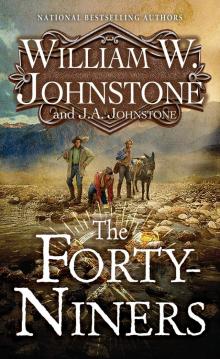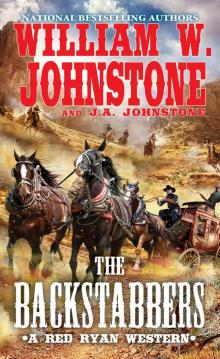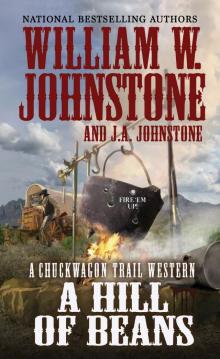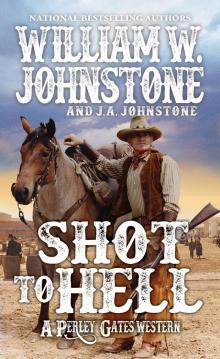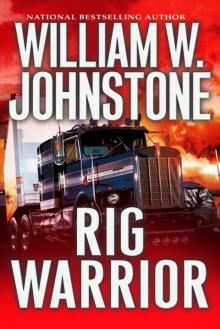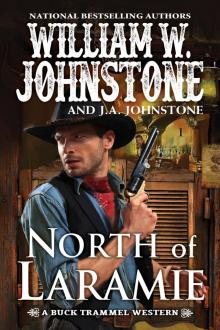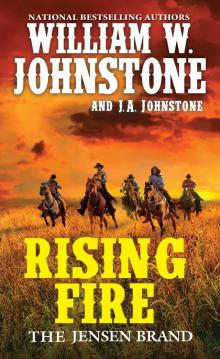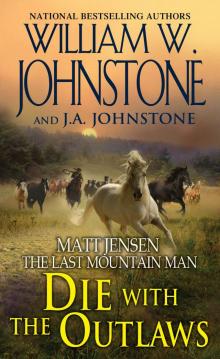The forty niners, p.1
The Forty-Niners, page 1





Look for these exciting Western series from bestselling authors William W. Johnstone and J. A. Johnstone
The Mountain Man
Luke Jensen: Bounty Hunter
Brannigan’s Land
The Jensen Brand
Smoke Jensen: The Early Years
Preacher and MacCallister
Fort Misery
The Fighting O’Neils
Perley Gates
MacCoole and Boone
Guns of the Vigilantes
Shotgun Johnny
The Chuckwagon Trail
The Jackals
The Slash and Pecos Westerns
The Texas Moonshiners
Stoneface Finnegan Westerns
Ben Savage: Saloon Ranger
The Buck Trammel Westerns
The Death and Texas Westerns
The Hunter Buchanon Westerns
Will Tanner, Deputy US Marshal
Old Cowboys Never Die
Go West, Young Man
THE FORTY-NINERS
WILLIAM W. JOHNSTONE AND J.A. JOHNSTONE
www.kensingtonbooks.com
Table of Contents
Also by
Title Page
Copyright Page
BOOK I
Chapter 1
Chapter 2
Chapter 3
Chapter 4
Chapter 5
Chapter 6
Chapter 7
Chapter 8
Chapter 9
Chapter 10
Chapter 11
Chapter 12
Chapter 13
Chapter 14
Chapter 15
Chapter 16
Chapter 17
Chapter 18
Chapter 19
Chapter 20
BOOK II
Chapter 21
Chapter 22
Chapter 23
Chapter 24
Chapter 25
Chapter 26
Chapter 27
Chapter 28
Chapter 29
Chapter 30
Chapter 31
Chapter 32
Chapter 33
Chapter 34
Chapter 35
Chapter 36
Chapter 37
Chapter 38
Chapter 39
Chapter 40
Chapter 41
Chapter 42
Chapter 43
Chapter 44
Chapter 45
Chapter 46
KENSINGTON BOOKS are published by
Kensington Publishing Corp.
119 West 40th Street
New York, NY 10018
Copyright © 2024 by J.A. Johnstone
All rights reserved. No part of this book may be reproduced in any form or by any means without the prior written consent of the Publisher, excepting brief quotes used in reviews.
This book is a work of fiction. Names, characters, businesses, organizations, places, events, and incidents either are the product of the author’s imagination or are used fictitiously. Any resemblance to actual persons, living or dead, events, or locales is entirely coincidental.
To the extent that the image or images on the cover of this book depict a person or persons, such person or persons are merely models, and are not intended to portray any character or characters featured in the book.
PUBLISHER’S NOTE: Following the death of William W. Johnstone, the Johnstone family is working with a carefully selected writer to organize and complete Mr. Johnstone’s outlines and many unfinished manuscripts to create additional novels in all of his series like the Last Gunfighter, Mountain Man, and Eagles, among others. This novel was inspired by Mr. Johnstone’s superb storytelling.
KENSINGTON BOOKS and the WWJ steer head logo are trademarks of Kensington Publishing Corp.
ISBN: 978-0-7860-4996-7 (ebook)
ISBN: 978-1-4967-4567-5
Then shalt thou lay up gold as dust, and the gold of Ophir as the stones of the brooks.
—Job 22:24
He that trusteth in his riches shall fall; but the righteous shall flourish as a branch.
—Proverbs 11:28
BOOK I
Chapter 1
The Ozark Mountains, Arkansas, 1848
Cord Bennett laid his cheek against the smooth wood of the rifle stock, peered over the barrel at his target, held his breath, and squeezed the trigger.
The old flintlock boomed and kicked hard against his shoulder. Gray smoke gushed from the barrel. For a moment, Cord couldn’t see what he’d just shot at.
Then the smoke cleared, and he spotted the small, furry shape lying on the ground at the base of the tree. A moment earlier, the squirrel had been standing on a branch, chattering away.
The critter was dead now, head clipped clean off by the ball from Cord’s rifle. That left the body intact for skinning, cleaning, and plunking in the stewpot.
Along with the other three squirrels Cord had shot earlier during his tramp through the woods, they would make a nice mess of vittles. Enough to feed Cord, his pa, and his two brothers for a couple of meals, anyway.
Cord walked over to the trees to pick up the squirrel he’d just shot and add it to the bounty in the sack slung over his shoulder. He was glad it had been a productive jaunt and he wouldn’t come home empty-handed.
Whistling a little tune, Cord started to walk off, but then he stopped. Even though there was nothing all that dangerous in these woods, a smart man reloaded his rifle as soon as he got a chance after using it. An empty rifle wasn’t worth a blamed thing unless the threat got close enough to use it as a club. It was just a burden.
Once the flintlock was ready to fire again, Cord started home. In his early twenties, he was of medium height but appeared slightly stocky because of the heavy muscles he had developed working on the farm. His back and shoulders stretched the fabric of the homespun shirt he wore.
He had no hat, so the sun beat down on the thick shock of light brown hair on his head. His face was open and friendly, often smiling, an indicator of his stubborn determination to make the best of things, no matter how bad they got.
And here lately, they had gotten pretty bad.
He emerged from the trees and came out at the top of a bare slope overlooking the little mountain valley where the Bennett family farm was located. Smoke curled from the stone chimney at one end of the log cabin.
Beyond it was the shed where the milk cow and the two mules were kept, and past that was the hog pen. Chickens pecked futilely at the bare ground between the cabin and the shed and pen. Maybe they thought they saw some bugs, but Cord was pretty sure they were mistaken.
The fields stretched off to the left, toward the head of the valley. They looked pretty pathetic. The corn was dying from the hot, dry weather. The fruit trees in the little orchard had produced what looked, earlier in the summer, like it might be a pretty good crop.
But now the fruit was shriveling up, too. Nothing could grow worth a lick in weather like this. Even the hog pen had just about dried up, and the hogs were covered with crusted dirt instead of mud. They looked miserable.
And the worst part of it was, this was the second summer in a row with such prevailing conditions. The relief the area had gotten during the previous fall and winter hadn’t been enough to allow things to recover.
Cord shook his head and told himself not to dwell on such things. You had to take the world and do what you could with it. You sure couldn’t reach up to the sky and shake the rain out of it, no matter how much you might feel like doing that.
He saw no sign of his older brothers Flint and Steve and didn’t know if they were inside the cabin or off somewhere else. Not that it mattered. Cord couldn’t blame them for not working. What could they do . . . what could anybody do . . . in weather like this.
A moment later, his pa come out of the cabin and walked around toward the shed and hog pen. Verne Bennett was tall and rake-thin, with white hair under his shapeless old hat and a white beard. Cord saw the sun flash off something his pa was holding and realized Verne had a knife.
He was going to butcher one of the hogs, Cord thought, thinning the bunch even more. Eventually the hogs would all be gone.
That wasn’t necessary today, not with the bounty Cord was bringing in. Cord leaned the rifle against a nearby tree and cupped his hands around his mouth to shout, “Pa, wait!” The words echoed from the hills that surrounded the valley.
Verne halted and looked around toward the hill where Cord stood. At that moment, Cord caught a flash of movement from the corner of his eye and turned his head to the left to look along the valley.
Dust rose in that direction. After a second, he spotted the buggy heading toward the farm. He waved his arm so his pa could see and then pointed in that direction.
“Company comin’!”
That was a stroke of luck. Verne turned away from the hog pen so he could greet the visitor, whoever that might be. Mountain hospitality wouldn’t allow him to do any less. That would give Cord time to get down the hill and let his pa know about the squirrels in his sack.
It rankled a little, knowing Pa hadn’t had any confidence that he’d bring back some game.
By the time Cord reached the bottom of the hill, the buggy had stopped in front of the cabin. He saw sunlight flash again, this time on fair hair, not the blade of a butcher knife. His heart gave a little jump in his chest as he recognized Caroline Stockton on the buggy seat.
Cord had been sweet on Caroline for almost as far back as he
And he wasn’t fond of the idea of his daughter getting mixed up with a hardscrabble farmer like Cord.
Luckily for Cord, Caroline didn’t seem to feel the same way. She’d been friendly ever since they were kids, and as they got older, that friendship showed signs of maturing into something deeper.
Cord sure hoped so, anyway.
As he walked up, his father was standing beside the buggy horse, holding the animal’s headstall while Caroline sat on the seat. She turned to Cord with an excited smile and said, “There you are! I was hoping you’d be here.”
“Where else would I be?” Cord asked, then immediately felt like an idiot for saying that.
“Why, off tramping around in the woods, of course. You like to do that better than anything else, don’t you?” She gestured toward the sack slung from his shoulder. “And I see that’s exactly what you’ve been doing.”
Cord glanced down at his side. Blood from the squirrels had soaked through the cloth and was dripping slowly from the bottom of the sack. He was embarrassed that somebody as refined as Caroline had to witness such a crude spectacle.
He muttered, “Let me do something with these,” and started to turn away, but his pa stopped him.
“What you got there, boy?” Verne asked. “Squirrel or possum?”
“Squirrel. Four of ’em.”
“Well, give ’em here. I’ll tend to ’em whilst you talk to Miss Caroline. I expect it’s you she come to see, more’n me.”
She said, “I always enjoy visiting with you, Mr. Bennett. You know that.”
“Mebbe so, but I’m a better hand at cleanin’ critters than Cord is, so I’ll handle that chore.” Verne took the sack that Cord handed him and added, “Boy’s a better shot than me, though, I’ll sure give him that.”
Still feeling a little awkward and embarrassed, Cord watched his father walk around toward the back of the cabin and then said, “Pa’s the one who taught me how to shoot, so if I’m any good at it, he deserves the credit.”
“Along with your natural talent,” Caroline said. She waved a slim hand. “But I didn’t come here to talk about shooting squirrels. I came to see if you’d heard the news.”
Cord didn’t care about any news Caroline might have brought. He would have been content just to stand there and look at her, with her curly blond hair under a blue sun bonnet. She wore a matching blue dress that was store-bought, not homemade, and tight enough to reveal the appealing curves of her figure. Her blue eyes twinkled, and her red lips curved.
Cord had never seen a prettier girl.
Things might have gotten even more awkward if he hadn’t realized that she was waiting for a response from him. He tried to look like he was interested as he said, “What news? We don’t hear much of anything out here unless somebody comes by, and you’re the first one in days.”
“Joe Dalrymple, you know, the man who has the freight wagon, he delivered a load of goods to my father’s store this morning. He’d been up in Springfield and heard all about it there.”
“Heard all about what?” Cord asked, shaking his head a little in confusion.
“Why, the gold, of course.” Caroline’s voice held a note of awe and excitement as she went on, “They’ve found gold in California. Tons and tons of gold!”
Chapter 2
The tavern on the settlement’s outskirts didn’t have a sign or even a name, officially. Folks just called it Abijah’s Place, after the owner, Abijah Spencer. A squat building constructed of logs and stone, it had several tiny log huts behind it where Abijah’s brood of daughters worked.
From time to time, the pastors of the two churches in Wilbur—Baptist and Methodist—tried to rouse the righteous fury of the townsfolk against the sordid enterprise Abijah ran, but they never got very far with the effort. Too many of the settlement’s upright male citizens liked to slip out to Abijah’s place of a night and pay an occasional visit to his girls.
The tavern wasn’t very busy in the middle of the afternoon like this, but it was a hot day, and half a dozen customers were in the place, seeking refuge from the sun. The heat was like a fist in the face to any man foolish enough to step outside.
Flint Bennett picked up the big cup of beer in front of him and swallowed some of the bitter, brackish stuff. It wasn’t good, but it was wet, and if a man drank enough of it, it dulled the desperation somewhat.
On the other side of the table, Steve Bennett reached out with his empty cup to scoop more beer from the bucket the brothers had bought earlier with the last of their coins. Flint curled his lip in a snarl. Steve pulled his hand back without filling the cup.
“Sorry, Flint,” he said.
“Don’t go gettin’ more than your share,” Flint said.
“Didn’t mean to, I swear. Reckon I, uh, just forgot how much I’d had.”
“Never lose track of how much you’ve had to drink.” As the oldest Bennett brother, Flint regarded it as his job to dispense such bits of wisdom. “You want to get just drunk enough to take the edge off, but never so drunk that anybody can take advantage of you.”
Steve nodded. “Yeah, I’ll remember that.”
He probably wouldn’t, though, Flint brooded. Steve had never been very bright. He had gotten the size in the family, towering over Flint and the youngest brother, Cord, but not the brains. Flint was the one who had gotten the smarts, and Cord had gotten the shooting eye, along with a stubborn, annoying sense of right and wrong.
Cord didn’t know how to look at things from a practical standpoint. Flint did.
Life just hadn’t given him enough chances yet to demonstrate that ability. But sooner or later it would, Flint believed, and then he would show everybody how much a man with ruthless drive and determination could achieve.
Until then, he thought wryly, he would sit here and drink beer in this squalid tavern and whorehouse.
“You reckon all of Abijah’s girls are asleep?”
Flint didn’t realize at first that his brother had asked him a question. He gave a little shake of his head to break out of his reverie and then said disgustedly, “It’s the middle of the day. Besides, those cabins don’t have any windows. Shut the door and it’d be like an oven in there.”
“I don’t care if the door’s open.”
“No, you wouldn’t. But we spent the last of our money on the beer, remember? Anyway, we have other things to do.”
“Like what?”
Flint’s eyes narrowed as he looked at the table where four men sat playing cards. He recognized three of them: a farmer from up in the hills foolishly losing what little bit of money he’d saved up, and two store clerks from here in Wilbur. They were losing steadily, too.
The fourth man, the stranger, was the only one who appeared to be winning regularly. He’d built up a nice pile of coins in front of him. He was dressed well enough in a suit and beaver hat that Flint took him to be a traveling gambler. Those other fellas at the table never really had a chance. They should’ve had more sense than to play with him.
But if everybody had good sense, the world would be a tougher place for a smart man to survive in.
“I’m out,” the farmer announced as he threw in his cards. The sigh he let out held all the weariness in the world. “I’m plumb busted. My wife ain’t gonna be happy.”

